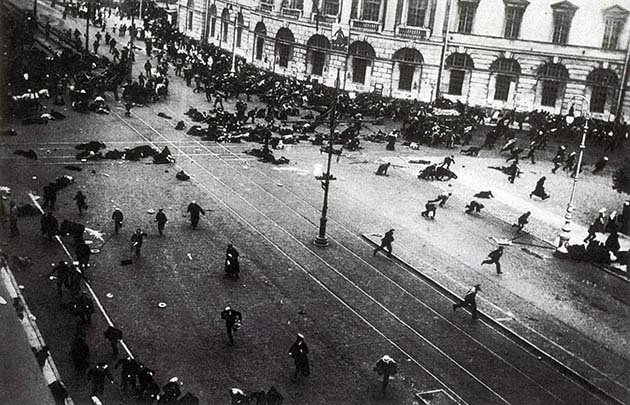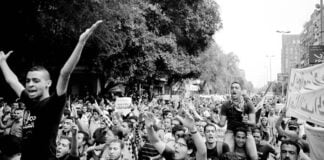By July 1917, workers and soldiers in Petrograd were desperate to seize power. The Bolsheviks’ decision to hold back the uprising averted disaster, explains Sophie Joo
The July Days were the third major political crisis between Russia’s two revolutions in February and October 1917. It marked a critical point as opposition to the Provisional Government increasingly grew. July 1917 provided significant lessons regarding the timing and nature of the revolution as well as the role of the revolutionary party.
After Tsarism was overthrown in February a Provisional Government was set up. However workers councils, Soviets, also emerged, resulting in a situation of dual power in Russia.
Whilst the Provisional Government controlled by the dominant capitalist party, the Cadets, held state power, the Soviets retained the support of the majority of people.
Lenin’s April Theses won the Bolsheviks to the aim of a second revolution that would deliver all power to the Soviets.
Sections of the working class however, grew increasingly impatient. With the workers having gained a sense of their power to bring down governments, they were not going to sit idly by and wait whilst their material conditions continued to deteriorate.
The Provisional Government continued with the war effort. Land was not re-distributed. Despite nominal wage rises since February, rising inflation meant people were still starving.
Food prices continued to sky rocket. In April, bread rations were reduced. By May, coal needs were not being met. Over 500 factories went bankrupt, resulting in huge unemployment.
There was fervent desire for the food, the land and peace that was promised.
This led to growing support for the Bolsheviks. When the Menshevik leaders called a rally in Petrograd in June in the name of the Soviets, it backfired with workers demonstrating under Bolshevik slogans. Bolshevism was not yet a majority force within Russia at that time but the workers of Petrograd who joined the enormous rally of 400,000 already wanted the end of the Provisional Government and Soviet power.
Soldiers in Petrograd were particularly enraged. On 18 June, the Provisional Government launched a new military offensive against Germany. When soldiers were ordered to prepare for a move to the front, a decision was made by the machine gun regiment that they would not go, “to the German front, against the German proletariat, but against their own capitalist ministers.”
Another order to transfer to the front on 30 June served as a catalyst to the demonstrations in July.
The soldiers sent agitators to army regiments across the capital and into the factories calling for the immediate overthrow of the government.
Whilst the soldiers were organising for armed protests and possible insurrection, Lenin and the Bolshevik Party were arguing for patience. They recognised the need to win the majority of the working class before a successful second revolution could occur.
However, even rank-and-file Bolshevik members were swept up by the calls for insurrection.
The leaders of the Bolshevik Military Organisation in particular, who had closer interactions with the workers and soldiers in Kronstadt, supported calls for escalation.
The disjuncture between the Bolshevik Central Committee and the military organisation was clear in their respective papers, Pravda and Soldatskaia Pravda. Whilst Pravda emphasised the need to win over the masses, Soldatskaia Pravda called for an insurrection on their front-page article.
On 4 July, 500,000 soldiers and workers staged an armed demonstration. They carried slogans including an end to the Provisional Government and its ten capitalist ministers. People were on the streets, demanding for all power to be given to the Soviets.
However, when the rally called on Lenin to speak, rather than a call to arms he raised the need for “firmness, steadfastness, and vigilance” and told them only that their calls for insurrection would eventually triumph.
After two days the Bolshevik Central Committee issued an appeal for an end to the demonstrations and for a return to work, and managed to wind down the movement.
Premature insurrection
Lenin and the Central Committee’s reining back of the attempt at insurrection disappointed and confused many rank-and-file workers and even some Bolshevik Party members. There was a growing impatience with the Provisional Government as people’s lives continued to worsen.
In Petrograd, workers and soldiers were ready to seize power. But Petrograd was far in advance of the rest of the country. At the nationwide Congress of Soviets that began on 3 June, the Bolsheviks had only 105 out of the 777 delegates.
Even in Moscow, the majority of workers and soldiers did not participate in the July demonstrations.
As in any revolution, the political development of the working class was uneven.
A layer of workers in Petrograd in particular already wanted to take power. But for the revolution to succeed, the majority of the class would also need to reach that conclusion. In July, the attempt at an insurrection was premature.
The Soviets, still consisting predominately of Mensheviks and members of the Socialist Revolutionary (SR) party, were not willing to take power.
The Menshevik and SR parties had joined the Provisional Government, and proved time and time again to side with bourgeois interests at the expense of workers and peasants.
The workers’ frustration with the Soviet leadership was symbolised in the actions of a sailor from Kronstadt, who demanded SR leader Chernov during the July days to, “take power you stupid bastard when it is being handed to you on a plate!”
This epitomised the great paradox of the crisis of July. Workers in Petrograd were calling for Soviet power, whereas the Soviets’ reformist leadership were opposed to this. The majority of the working class needed to be won to the idea of Soviet power before this situation could shift.
Bolsheviks’ response
If the Bolsheviks had seized power in July, they would not have been able to hold it.
In October, it was not the actual act of overthrowing the Provisional Government that proved most difficult but defending and maintaining the revolution afterwards.
An uprising in Petrograd in July would have been isolated from the rest of Russia and crushed, with thousands killed and the most militant section of the Russian working class destroyed.
And so, whilst April saw Lenin fighting the conservatism within the Party, he now had to make the argument for patience. What he and the central committee recognised was that the majority of the working class still needed to be won over. Only then could the revolution succeed.
The Central Committee rightfully recognised the huge importance in retreating from an insurrection.
At the same time, as Lenin wrote, it would have been a betrayal had the Bolsheviks abstained from the spontaneous armed demonstrations. Whilst the party vehemently opposed calls for an uprising, they took to the streets to join the protests.
As Lenin wrote, “Mistakes are inevitable when the masses are fighting, but the communists remain with the masses, see these mistakes, explain them to the masses, try to get them rectified, and strive perseveringly for the victory of class-consciousness over spontaneity.”
The revolutionary party
The retreat came at a cost. The government unleashed a wave of counter-revolution in retaliation.
The most rebellious regiments were broken up and sent to the front and attacks on workers intensified. Far-right, anti-Semitic gangs, the Black Hundreds, also came out in attack.
Bolshevik leaders were arrested, Pravda’s offices were seized and Lenin as well as other Bolshevik leaders went into hiding.
However, this was not the decisive defeat for the workers that would have resulted from a premature uprising. Nor was Bolshevism destroyed.
The July Days demonstrated the strength of the proletariat and the growing respect for the Bolsheviks.
Holding back the attempted insurrection was no mean feat. It was only possible because of the existence of a revolutionary party which commanded deep respect amongst the working class.
The mass membership and influence of the Bolsheviks within the most militant layers of the working class meant that they were able win the argument against an insurrection. Even before the revolution in February, the Bolsheviks had almost 24,000 members.
This support had been built up over years of activity in the lead up to 1917, not least in the failed revolution of 1905.
Despite many individual members and some party committees initially defying the leadership, Lenin and the Central Committee were ultimately able to maintain party discipline.
Events in Germany in 1919 showed the consequences where such a party was missing.
The year before workers and soldiers led a revolution that overthrew the monarchy, as in Russia in February.
But in 1919 the militant minority of workers were provoked into a premature insurrection in Berlin. The leadership of the newly formed German Communist Party opposed the uprising, but its lack of support in the factories or of any capacity to act in a united way meant it could have no influence on events.
As a result, the attempt to seize power was crushed and the counter-revolution saw many of the most militant workers killed. The Communist Party’s best leaders, including Rosa Luxemburg and Karl Liebknecht, were executed. The hope of a socialist revolution in Germany was squandered.
Despite experiencing a minor set-back immediately following the July Days, the influence of Bolshevism in Russia soon began rising again. On 31 August, the Bolsheviks took the majority in the Petrograd Soviet for the first time.
By October, when the opportunity arose again, the party and the masses were ready for Russia’s second revolution.






